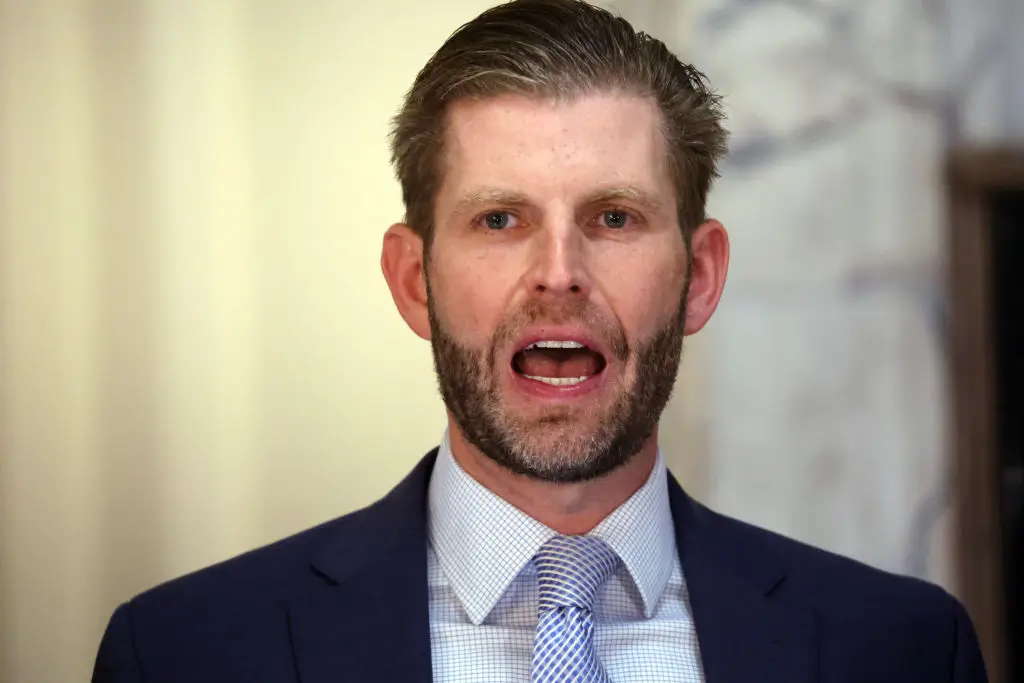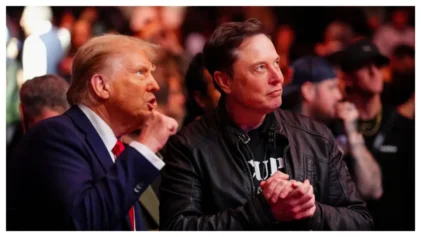Billionaire donors were willing to help Donald Trump with the multimillion-dollar bond he would have had to raise to appeal his civil fraud judgment awarded to the state of New York, according to a new report.
The news merged as his son, Eric Trump, also said dozens of bond companies had refused to help his father as the Republican front-runner faced the risk of having his assets seized by the state attorney general.
Attorney General Letitia James could have enforced the $454 million judgment against Trump once it became final last month. However, she granted Trump a 30-day reprieve that ended on Monday, March 25. Yet, an appeals court ruled Monday that Trump only had to pay a $175 million bond within 10 days to appeal the judgment, which Trump then said he would “abide by.”
However, during an appearance on “Sunday Morning Futures,” the younger Trump griped to Fox News host Maria Bartiromo that he had participated in negotiations with multiple sureties who basically laughed at the former president as he struggled to raise over $400 million to salvage his New York empire.
“Every single person when I came to them saying, ‘Hey, can I get a half-billion dollar bond?’” Eric Trump told Bartiromo about the high-stakes discussions, adding: “Maria: they were laughing. They were laughing.”

Previously, the surety companies said they were not willing to accept real estate or other hard assets as collateral for such a large amount of money.
Trump was ordered to pay the massive fine after being found liable for inflating the value of his New York real estate, including his hotels and golf clubs while manipulating his taxes and defrauding banks and insurers for decades.
Still, it is a contrast from the $558 million in collateral for the original bond, which Trump would have been required to pay to surety companies, according to his attorneys. During the March 24 news segment, Eric Trump accused the billionaire bondholders of conspiring to ruin Trump financially.
“They’re trying to deprive him of his cash because they want to bankrupt him,” Eric Trump said. “They want to hurt him so badly, and it’s going to backfire because he’s going to win this in November.”
The former president’s son also took aim at his father’s critics, claiming Mar-a-Lago is worth a billion dollars by itself. He bragged that Trump was a transformative figure who helped build New York’s skyline and demanded better from his Republican backers.
Meanwhile, a new report from Reuters shows that at least two billionaires were secretly working to gather funds for the original bond. Hedge fund founder John Paulson and oil and gas magnate Harold Hamm were among those named by the outlet, according to its sources.
Since the civil fraud verdict, the former president has been hard-pressed to pay the penalty as well as a separate judgment issued in a defamation case brought by author E. Jean Carroll, in which Trump owes another $83 million.
For weeks, speculation has swirled over whether Trump has the means to cover the spiraling fines, given his apparent struggles to pay after he bragged for years about being one of the world’s wealthiest billionaires.
Trump stands to gain $3 billion from his social media platform Truth Social when it goes public in the coming months. However, these funds are not expected to be immediately available to pay his fines.
Trump said that he may not currently have enough money readily available as cash to post the required bond, although his family has not acknowledged this publicly.
Last year, Trump stated he had approximately $400 million in cash reserves, which stood to be depleted by his extraordinary legal penalties. However, his most recent financial statement for the fiscal year ending June 30, 2021, showed he had about $294 million in cash or cash equivalents.
Following his financial statement, Trump reportedly gained approximately $186.8 million from selling the lease on his Washington hotel in May 2022 and the management rights to a New York City golf course in June 2023.
As part of Trump’s penalty, he must surrender these proceeds, along with interest.
The majority of Trump’s net worth, which he claims is several billion dollars, is invested in golf courses, skyscrapers, properties, and other holdings.
Trump’s dire financial situation became more apparent in February when campaign disclosures revealed about $50 million from Republican donors was used to pay Trump’s runaway legal bills as he faced a panoply of criminal and civil charges.
In a recent legal filing, Trump’s attorneys argued that the massive sum to secure the bond for the appeal was extreme, stating that enforcing such an exceptional requirement was unfair to Trump.
However, the ruling states that the bond can be funded by multiple sources, not just one.
In a defiant post to Truth Social last week, Trump said he was willing to sell some of his properties for cheap “fire sale” prices in order to pay the fine, and then took aim at Manhattan Supreme Court Judge Arthur Engoron for the historic ruling against him.
“Judge Engoron actually wants me to put up Hundreds of Millions of Dollars for the Right to Appeal his ridiculous decision. In other words, he is trying to take my Appellate Rights away from me,” Trump wrote, accusing the judge of election interference. “Nobody has ever heard of anything like this before.”


